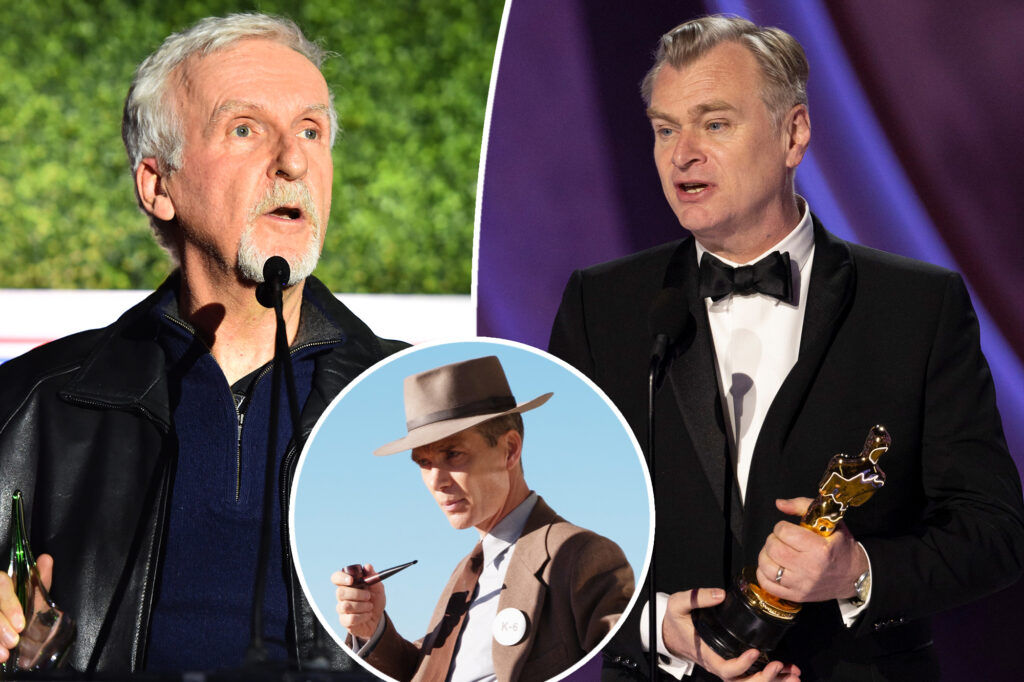In a striking critique from one filmmaker to another, James Cameron has openly criticized Christopher Nolan’s Oscar-winning film Oppenheimer for what he describes as a “moral cop out” regarding the depiction of nuclear war. Cameron, aged 70, shared his thoughts during an interview with Deadline, where he discussed his upcoming project based on Charles Pellegrino’s book Ghosts of Hiroshima.
The conversation turned to Nolan’s film when Cameron was asked about its success. “It’s interesting what he stayed away from,” Cameron remarked about Nolan, 54. “I love the filmmaking, but I did feel that it was a bit of a moral cop out. Because it’s not like Oppenheimer didn’t know the effects.”
Oppenheimer, which won seven Oscars including Best Picture, grossed nearly $1 billion worldwide. The film portrays the life of J. Robert Oppenheimer, played by Cillian Murphy, who was instrumental in developing the nuclear bombs dropped on Hiroshima and Nagasaki during World War II.
Cameron’s Critique of Historical Representation
Cameron expressed his dissatisfaction with the film’s limited depiction of the bombings’ aftermath. “He’s got one brief scene in the film where we see — and I don’t like to criticize another filmmaker’s film — but there’s only one brief moment where he sees some charred bodies in the audience and then the film goes on to show how it deeply moved him,” Cameron noted. “But I felt that it dodged the subject.”
He speculated on possible reasons for this omission, saying, “I don’t know whether the studio or Chris felt that that was a third rail that they didn’t want to touch, but I want to go straight at the third rail. I’m just stupid that way.”
Cameron has promised that his upcoming movie will focus on the stories of the nuclear bomb victims. “Okay, I’ll put up my hand. I’ll do it, Chris. No problem,” he stated, inviting Nolan to attend his film’s premiere.
Nolan’s Perspective on Omission
Nolan has previously addressed criticism regarding the absence of direct depictions of the bombings in Oppenheimer. In a 2023 interview with Variety, he explained, “The film presents Oppenheimer’s experience subjectively. It was always my intention to rigidly stick to that. Oppenheimer heard about the bombing at the same time that the rest of the world did.”
Nolan added, “I wanted to show somebody who is starting to gain a clearer picture of the unintended consequences of his actions. It was as much about what I don’t show as what I show.”
Historical Context and Filmmaking Choices
The debate between Cameron and Nolan touches on a broader historical and ethical discussion about how filmmakers choose to portray sensitive historical events. The bombings of Hiroshima and Nagasaki remain one of the most controversial actions in military history, with ongoing debates about their necessity and moral implications.
While Nolan chose to focus on the internal journey of Oppenheimer, Cameron appears intent on exploring the external devastation caused by the bombs. This reflects a fundamental difference in storytelling approaches: one that is introspective and another that is outwardly reflective.
Looking Ahead: Cameron’s Vision
Cameron has hinted at the direction his film will take, emphasizing a factual recounting of events over political commentary. “I don’t want to get into the politics of, should it have been dropped, should they have done it, and all the bad things Japan did to warrant it, or any of that kind of moralizing and politicizing,” he told Deadline. “I just want to deal in a sense with what happened, almost as if you could somehow be there and survive and see it.”
The anticipation surrounding Cameron’s project suggests that audiences may soon witness a different cinematic portrayal of one of history’s most devastating events. As both directors continue to shape the narrative of nuclear warfare through their films, the dialogue between them highlights the power of cinema to influence public perception and historical understanding.
About The Author
 The 100 Best Movies of the 21st Century: A Cinematic Evolution
The 100 Best Movies of the 21st Century: A Cinematic Evolution Donkey Kong Bananza: A Must-Have for Nintendo Switch 2 Enthusiasts
Donkey Kong Bananza: A Must-Have for Nintendo Switch 2 Enthusiasts California Judge Dismisses Jay-Z’s Lawsuit Against Lawyer Tony Buzbee
California Judge Dismisses Jay-Z’s Lawsuit Against Lawyer Tony Buzbee Hellmann’s Mayonnaise Unveils Art Gallery Pop-Up with Kareem Rahma
Hellmann’s Mayonnaise Unveils Art Gallery Pop-Up with Kareem Rahma Deadly Fire at Indian Pharma Factory Claims 39 Lives, Sparks Investigation
Deadly Fire at Indian Pharma Factory Claims 39 Lives, Sparks Investigation